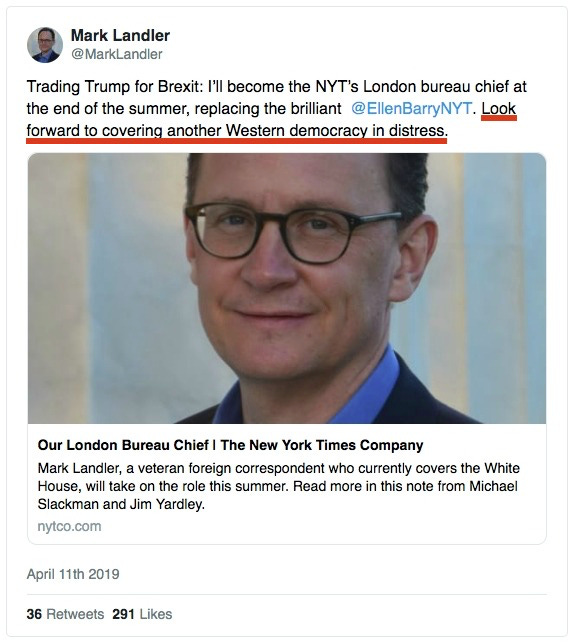What a story!
The decline of the West & the existential terror of being bored
This tweet caught my eye last spring:
I know that reporters love a “good story.” And I don’t mean to beat up on Mark Landler. But why would someone who is obviously gifted with words say that he’s “look[ing] forward to covering another Western democracy in distress”? Isn’t this crisis a bad thing, even if you’re riding high on the journalistic wave generated by this social and political earthquake? Wouldn’t it be wise to show a little less enthusiasm about a looming disaster?
Again, I get it: Journalists need stories, some story, any story. The (Media) Beast must be fed. And if that story is about “another democracy in distress” which might include… (wait for it)… Nazis! — well, that’ll work quite nicely.
Jack-booted racist thugs always draw a crowd. They also jack up subscriptions and “audience engagement” — but only if reporters obey one of journalism’s holiest commandments: Don’t be boring.
“I don’t like Mondays”
In 1982, the Washington Post published “BORING! BORING! Boring! Boring! Boring!” by Blaine Harden. It’s a wonderful essay, and worth reading in its entirety. But if you don’t have time, here are a few illuminating excerpts:
BOREDOM KILLS, and those it does not kill, it cripples, and those it does not cripple, it bleeds like a leech, leaving its victims pale, insipid and brooding. Examples abound.
From science: Worms trained to find water by crawling through a plastic tube soon get bored with the trick. Rather than repeat the simple-minded maneuver, they stop wiggling and die. Rats kept in comfortable isolation quickly become jumpy, irritable and aggressive. Their bodies twitch, their tails grow scaly. But when returned to their rat pals, their ills disappear. Humans kept in sensory-deprivation rooms report grumpiness, a willingness to believe in ghosts and hallucinations about little yellow men with black caps.
From the news: A 16-year-old girl in San Diego three years ago opened fire on an elementary school across the street from her house. With a .22-caliber rifle, she killed the school's principal, a janitor and wounded eight children. In the midst of her sniping she called a local newspaper and said: “I don't like Mondays. This livens up the day.”
From history: King Louis XIV, France's enlightened “Sun King,” was afflicted one summer in Holland with a deadly boredom. He’d gone up from Paris in 1673 to lay siege to a Dutch fortress, bringing along his queen, his mistress, his former mistress and 150,000 troops. King Louis had figured the siege would take all summer. Instead, it lasted only 13 days. The king and his fractious entourage had time on their hands. A defense minister wrote home: “His Majesty is no longer troubled, except by what to do with his armies.” With nothing better to do, Louis attacked a German city, infuriating the German and Spanish Hapsburgs, forcing them to take sides with the Dutch and prolonging a bloody war for five years.
From literature: The “delicate monster” of boredom, Baudelaire warned, would one day eat the entire world in an immense yawn.
…
The brain — whether a worm’s, a rat’s or a human’s — needs something to chew on. At its simplest level, boredom is the brain’s pained response to nothingness or to endless repetition. The discomfort of boredom, like the gnawing of an empty stomach, is the brain’s way of saying it’s hungry.
…
Unfortunately, the human mind in a high-tech society, with endless options for distracting, entertaining and narcotizing itself, cannot escape boredom solely by keeping busy. The bounty and opportunities of American culture, if anything, heighten boredom by accentuating the differences between what Americans can attain and what they settle for.
…
When a viewer compares his life and times to that of the Ewings of “Dallas,” where sexual acts and million-dollar deals are consummated before breakfast, he is bound to find himself dull. When the TV is turned off, real life — the boring real life where there’s no luscious blond before breakfast and no free lunch — seems even more boring. If only a smidgen of this idiotic videoland value system infects the way Americans think (as it surely has), then the spread of boredom is guaranteed.
…
There is considerable evidence that many Americans suffer from a boredom which, in the most literal way, amounts to what Kierkegaard called “sickness unto death.”
…
In Jimmy Carter’s White House, former speechwriter James Fallows remembers there was “a constant yearning for a crisis to manage.” A crisis, Fallows says, was considered “so much more exciting and more fun than just business as usual. If you had a crisis to manage, you didn't need to think about what to do with your time."
…
Dr. Ramey, the Georgetown School of Medicine physiologist and student of boredom, says the human brain reacts to boredom by either atrophying or groping for diversion. Boredom, in the best of all possible worlds, can be productive — a necessary interlude before useful, creative efforts. But too much of it, Ramey says, turns the brain inward, cannibalizing itself. Memory fades and the brain can’t figure out what to do next.
All this helps explain why Mark Landler is “look[ing] forward to covering another Western democracy in distress.” He’s simply supplying the drug we so desperately desire and require.
Taking this drug means your brain won’t turn inward and cannibalize itself.
Taking this drug also means we’re ingesting a story about people turning outward and cannibalizing each other.
As I’ve said before:


